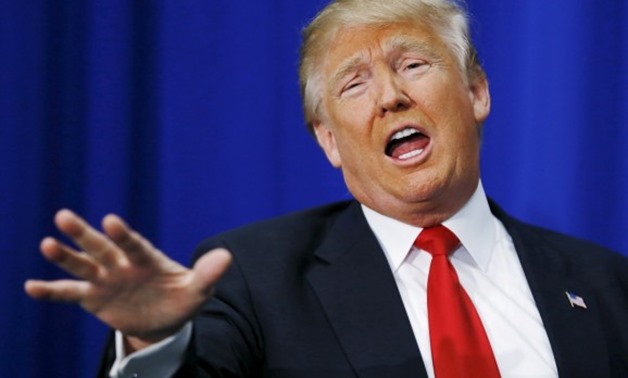
Then-Republican presidential candidate Donald Trump speaks at a campaign rally in Fort Worth, Texas, February 26, 2016. REUTERS/Mike Stone
CAIRO – 17 January 2018: Three days after waiving sanctions as part of the Iran nuclear deal, U.S. President Donald Trump thanked the Qatari Emir for “actions to counter terrorism and extremism in all forms.” Both acts reflect that his statements are not aligned with the U.S. interests and subsequently do not match his actions.
Trump's recent statement on Qatar contradicts his earlier stance in June when he called for the Gulf princedom to stop funding terrorist groups, saying it had historically done so "at a very high level." His statements came after four Arab states - Egypt, Saudi Arabia, United States, and Bahrain - severed ties with Qatar for supporting terrorism.
Trump's statements on Qatar at that time raised concerns over the status of the U.S. military base al-Udaida - hosted by the Gulf state - where almost 11,000 U.S. personnel are stationed. In July, Trump commented in an interview with the Christian Broadcasting Network that 10 other states would like to "build" another one for the U.S. and "pay for it" in case it had to leave the one in Qatar. That base was used by the U.S. to run operations in Iraq, Afghanistan, and Syria.
Trump's earlier statements on canceling the 2015 Iran nuclear deal have been opposed by other parties in the deal as well as internal political forces.
Although he waived the sanctions against Iran for this year, the U.S. president had set an ultimatum to remedy the "disastrous flaws" in the agreement signed by Iran and 14 parties in 2015 so that Iran would restrict its nuclear program to peaceful uses. He wants that additional agreement to go into effect within 120 days.
In parallel, the U.S. president imposed other sanctions on 14 Iranian entities and individuals, including judiciary head Ayatollah Sadeq Larijani. Both actions were condemned by the Iranian foreign ministry which stressed that the multilateral deal is not "renegotiable."
By contrast, Qatar has strong relations with Iran rooted in mutual economic interests as both share the largest independent undersea gas field in the world known as South Pars in Iran and as North Dome in Qatar.
The field’s total area is 9,700 square kilometers, of which 3,700 square kilometers are in Iranian territorial waters and 6,000 square kilometers are in Qatari territorial waters.
In January 2014, Qatar offered to help Iran in developing the field as the latter has been trying to do so for two decades but could not due to the sanctions imposed on the country since the revolution in 1979. Furthermore, the company Total signed a contract with Qatar and Iran in July to help them expand production of South Pars/North Dome gas field, according to Reuters.
On the other hand, Qatar has been supporting Iran-backed Shiite groups in certain Arab countries, including fellow Gulf states, such as Lebanon's Hezbollah, Bahrain, and Kuwait.
International Relations Professor at Cairo University Mohamed Hussein told Egypt Today that Trump's statement on Qatar stems from internal pressure by many entities to preserve U.S. interests.
Such interests are not only embodied in al-Udaida military base in Qatar but also in economic relations. Amid the crisis in June, Qatar signed a $12 billion deal with the U.S. to procure F15 fighter jets. In December, Boeing announced it was awarded a $6 billion contract to manufacture 36 F15 jets for Qatar. All aircrafts would be delivered by 2022.
Hussein added that Iran would never back off from accomplishing its nuclear program to produce nuclear weapons. He explained that the other parties agreed to sign the deal as they realized that the sanctions had been useless with both Iran and North Korea.
Thus, they perceived lifting sanctions as a measure that can serve their economic interests and delay Iran's progress in acquiring such weapons, the expert said. As for the ultimatum Trump suggested, the international affairs professor commented that Iran has been very strong in handling negotiations over its nuclear program and chances it would accept further conditions are quite low.
Hussein speculated that Iran, "which has expansionist schemes," would never allow an inspection by any international or foreign entities, although that measure is stated in the 2015 nuclear deal as it is required to give the International Atomic Energy Agency (IAEA) access to its nuclear facilities.
Moreover, the United States would be quite wary from taking military action against Iran at the moment so as North Korea would not seize the opportunity to fire ballistic missiles into Japan, Guam and/or U.S. forces in the Pacific Ocean, the professor said.
He also speculate that the United States and its allies would condone the fact that Iran and North Korea are obtaining nukes as any attempts to attack nuclear plants in Iran would incur its retaliation by targeting Israel's nuclear plants.
However, Hussein does not discard the possibility that some of the world’s major powers would on the long run manage to destroy Iran's ballistic missiles.


Comments
Leave a Comment